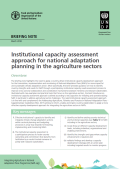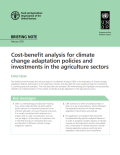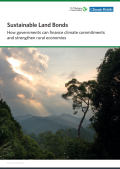
The briefing note Institutional Capacity Assessment Approach for National Adaptation Planning in the Agriculture Sectors highlights the need to apply a country-driven institutional capacity development approach for the formulation, implementation and monitoring of National Adaptation Plans (NAPs) for more impactful and sustainable climate adaptation action.

This briefing note Cost-benefit Analysis for Climate Change Adaptation Policies and Investments in Agriculture illustrates the role and logic of Cost-Benefit Analysis (CBA) in the evaluation of climate change adaptation policies and projects in the agricultural sector and describes the main analytical steps for conducting it, providing practical examples.
The historic climate accord from 2015 seeks, at minimum, to limit average global temperature rise to “well below 2°C” in the present century, compared to pre-industrial levels. Renewables, in combination with rapidly improving energy efficiency, form the cornerstone of a viable climate solution.
Keeping the global temperature rise below 2 degrees Celsius (°C) is technically feasible. It would also be more economically, socially and environmentally beneficial than the path resulting from current plans and policies. However, the global energy system must undergo a profound transformation, from one largely based on fossil fuels to one that enhances efficiency and is based on renewable energy. Such a global energy transformation – seen as the culmination of the “energy transition” that is already happening in many countries – can create a world that is more prosperous and inclusive.
Global Energy Transformation: A roadmap to 2050 sets out how an energy transition acceleration could be achieved. It outlines the supply side and demand side technological changes required, and indicates the level of investment needed.

This paper Sustainable Land Bonds: How Governments can Finance Climate Commitments and Strengthen Rural Economies shows how tropical forest countries can access large amounts of inexpensive capital through issuing Sustainable Land Bonds (SLBs) that can be used to finance the largescale transition to sustainable and low-carbon land management practices.
The production of Renewable Natural Gas (RNG) from organic waste for use as a vehicle fuel is an emerging strategy that businesses, states, and municipalities in the United States are pursuing to make use of waste-derived methane and lower the carbon footprint of vehicle fleets.
The Production and Use of Renewable Natural Gas as a Climate Strategy in the United States explores RNG’s potential as a climate-change strategy in the U.S., including the conditions under which it can achieve large greenhouse gas (GHG) emissions reductions compared to fossil fuels used to power vehicles.
